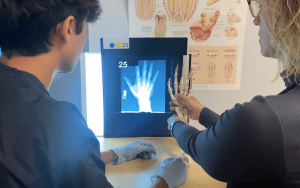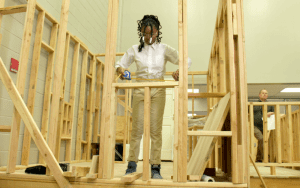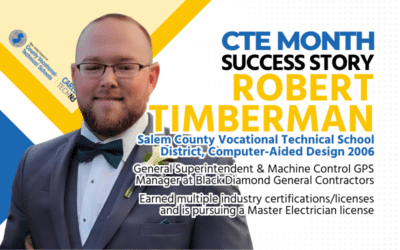
An Academy of Health Care Sciences student from Morris County Vocational School District spends time learning in a hospital setting through a partnership with St. Clare’s Health.
When Rachael Coffey began thinking about how she’d spend the four years after 8th grade, she had to make decision: Should she go to the high school to her hometown of Little Ferry? Or should she try to get into a vocational-technical school?
Ultimately, the choice become clear.
Rachael completed a rigorous application process — which included submitting an essay, letters of recommendation and a transcript — to try for a spot at Applied Technology High School, a specialized school on the Paramus campus of Bergen Community College.
“I initially decided to apply to a technical school because a lot of my family, friends who went to these schools were able to study something that interested them and it gave them an opportunity to pursue a career that interested them,” said Rachael, a junior studying cybersecurity at the high school.
Student interest in vo-tech programs at New Jersey’s most coveted, specialized high schools is increasing — and, gradually, so are the number of available seats.
Though New Jersey’s vo-tech schools still include programs where students can study auto mechanics, hairdressing, welding and other trades, the system also includes a growing number of highly-specialized high schools for top students studying math, science, the arts and more.
Many of the schools include competitive admissions and entrance exams for students to get a seat.
Of the state’s over one million public school students who went back to school this fall, about 34,000 are enrolled in career-focused programs in the county vocational-technical school districts.
Enrollment in these schools has grown by about 23% over the past two decades and by about 6% over the past nine years, according to the New Jersey Council of County Vocational-Technical Schools.
And every year, the most competitive, admission-only schools say they have to turn away more applicants than they can accept.
However, since 2018, the availability of seats in the specialized high schools has increased thanks to employer partnerships and funding from a state grant, according to the New Jersey Council of County Vocational-Technical Schools, a state association that represents all 21 county vocational-technical districts.
“The state recognized that we were turning away so many students and they wanted to expand to allow more students to enter and so they invested in us,” said Jackie Burke, executive director of the council.
There are now 21 county vocational-technical districts in New Jersey — one for each county— and over 60 schools operated by those districts.
Some of these institutions are dubbed “career academies” and “tech schools,” or refer to themselves as “magnet schools.” But, according to Burke, none of the schools in the districts fit the traditional definition of “magnet schools” because they primarily focus on specific career pathways instead of just drawing top students.
Once admitted, the high schoolers dedicate the majority of their daily schedules to their chosen career specialties, including health sciences, engineering, construction, communications, performing arts or business.
“Students go into these schools because they have career focus,” said Burke. “We have hundreds of career programs and so they are able to go to our school, get their academics … and then they have blocks of learning just for their career education.”
Some of these institutions also provide adult programs, which are specialized career sessions that are typically three to 24 months long.
In 2018, New Jersey voters approved a ballot question that allocated $275 million in grant funding to expand county college vo-tech institutions and career technical schools.
The funding has enabled many schools to add new buildings, introduce new programs or begin expanding, according to officials. Once these projects are fully completed, an additional 4,500 spots will become available at the state’s vo-tech institutions.
Gloucester County Institute of Technology opened a new annex building for manufacturing and applied science, which welcomed its first group of about 30 high school students last month.
“A role of a county vocational school is to be able to evolve to meet the changing employment needs of your community,” said Mike Dicken, superintendent of Gloucester County’s vo-tech district.
“When those grants became available, we started to work with our workforce development board and local employers and also … Rowan University to see what were the changing and evolving employment needs in our county,” he added.
The expansion of South Jersey’s manufacturing industry and the demand for skilled employees influenced school officials to start the manufacturing and applied science academy, Dicken said.
Though the new annex building has relatively few students compared to the more populated Gloucester County Institute of Technology main campus of about 1,600 students, Dicken said there should be enough interest in manufacturing and applied science to fill up the academy over the next four years.
Employers and business partnerships play a large role in the growth of the vo-tech programs because companies are hiring students for internships, offering post-graduation jobs and even teaching classrooms.
When you step into the career-focus classrooms in some of the schools, you feel like you’re in a real hair salon, dentist’s office, kitchen or on a construction site because the approach to learning is meant to be hands-on, said Burke, executive director of the statewide vo-tech council.
“If we were learning about the different parts of a PC, (our instructor) would have us take apart PCs and learn about the different physical parts and actually understand where they go and what they do to make the PC work,” said Rachael, the student studying cybersecurity at Applied Technology High School in Paramus.

Omari Anna Jones, a recent graduate of Essex County Schools of Technology, learned aspects of architectural design and construction science in a classroom with space to construct a replica house from start to finish.
Students who attend the specialized high schools may miss out on some of the sports, extracurricular activities and traditional experiences in their hometown high schools, but many can earn college credits and be part of a small, focused group of students who share similar educational goals.
“I think it’s so cool to just be surrounded by people who are all academically focused … So many more people are pushing for that and definitely thinking about the future a little bit more,” said Abigail Mazurczyk, a junior at Monmouth County Academy of Allied Health and Science in Neptune.
Abigail’s school is one of the several New Jersey vo-tech schools ranked in the top 5% public high schools nationally.
This year was the first time in five years the state Department of Education evaluated every high school’s performance based on test results, graduation rates and other factors. County-run vocational-technical schools dominated the top 8 highest-raked schools.
However, critics argue that these rankings are unfair because county-run schools typically admit students based on admission tests and applications, resulting in a smaller enrollment of low-income students and those with disabilities.
Despite the growth in enrollment, the county-ran specialized high schools still encounter the ongoing challenge of educating both students and parents about the opportunities they provide, according to officials.
“One of the things our schools struggle with is still there’s a lot of outdated stereotypes of what kind of education is offered and what students should go to our schools,” Burke said.
The school’s missions have evolved from being primarily an option for students interested in learning trades to preparing the state’s highest-achieving students for college and offering nontraditional yet, in-demand pathways, like teacher training programs.
“They’re getting college credits, they’re getting training on their certification … They’re able to see what their future is going to be like, what kind of space are they going to be working in and they have the latest technology,” Burke said.
Please read this article by Nyah Marshall as it originally appeared Oct. 16, 2023 on NJ.com.



